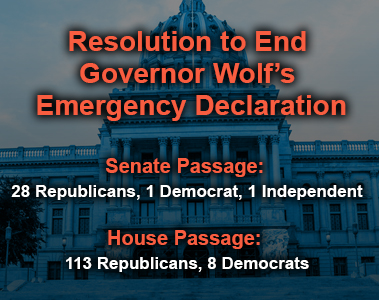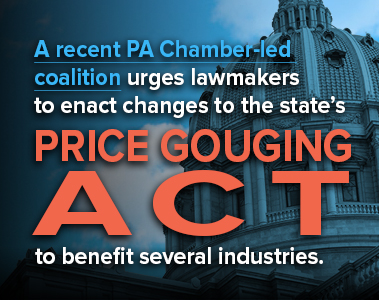As vaccination efforts continue to reduce COVID-19 cases across the Commonwealth and with the statewide mask mandate lifted on June 28, Pennsylvanians are beginning to return to a sense of pre-pandemic normalcy with an eye to the future. In keeping with this positive outlook, our organization is also pleased to report the recent lifting of the Wolf Administration’s COVID-19 Disaster Emergency Declaration through a concurrent resolution that recently received bipartisan votes in both chambers of the General Assembly.

In the Primary Election held last month, voters approved two changes to the state constitution related to the governor’s emergency powers. The first gave the legislature the ability to end or extend an emergency disaster declaration by a simple majority vote, and the second limited emergency disaster declarations to 21 days and allows the General Assembly to approve the extension via a concurrent resolution. Our organization supported these amendments before their approval by voters to restore checks and balances to the emergency declaration process and give the people the voice they deserve in deciding whether to continue them going forward.
The resolution was the first flexing of the legislature’s authority in this regard – a testament to the progress Pennsylvania has made in the fight against COVID-19 and the widespread belief that an emergency declaration was no longer necessary.
 While the declaration was certainly an understandable response to the early days of the pandemic when little was known about the virus and how to treat it, the fact is that continued disaster declarations do come at a heavy cost to the business community. Last session, when discussing another ongoing emergency declaration related to the opioid abuse epidemic (a declaration that has been renewed more than a dozen times over the last three years), the PA Chamber testified and sent communications to lawmakers about how these ongoing declarations trigger the Price Gouging Act. This exposes businesses, manufacturers and retailers to potential enforcement action from the state’s Office of Attorney General for excessively long periods. For example, pricing restrictions from late winter snowstorms have remained in place through the Fourth of July.
While the declaration was certainly an understandable response to the early days of the pandemic when little was known about the virus and how to treat it, the fact is that continued disaster declarations do come at a heavy cost to the business community. Last session, when discussing another ongoing emergency declaration related to the opioid abuse epidemic (a declaration that has been renewed more than a dozen times over the last three years), the PA Chamber testified and sent communications to lawmakers about how these ongoing declarations trigger the Price Gouging Act. This exposes businesses, manufacturers and retailers to potential enforcement action from the state’s Office of Attorney General for excessively long periods. For example, pricing restrictions from late winter snowstorms have remained in place through the Fourth of July.
These situations highlight the need to improve the Price Gouging Act, which, as currently written, subjects all consumer goods and services to pricing restrictions – even those entirely unrelated to the emergency itself. Legislation is moving through the General Assembly to mitigate these issues and provide guidance and clarity for employers and consumers alike.